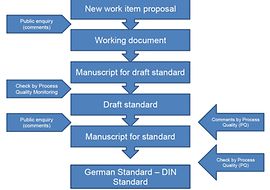Medium-sized companies
Contact and FAQ
Your contacts
Alexandra Horn
| Kevin Kemp
|
|---|---|
tel.: +49 30 2601-2806 | tel.: +49 30 2601-2461 |
Questions about SMEs and standardization are listed below.
FAQs
Cost reduction through
- Mass production and global purchasing
- Reduced transaction costs
- Lower adjustment costs
- Shorter development times
- The fact that standards are unambiguous, generally accepted rules of technology lends contracts that refer to standards greater legal certainty.
- Simplified procurement procedures.
- Standards provide clarity and transparency for suppliers and their customers, and facilitate the design, production and maintenance processes. Although standards are not legal provisions, they do become legally binding when they are part of a contractual agreement between parties.
- Standards help make production processes more efficient and ensure a more consistent, comparable quality of products, thus enhancing consumer trust.
- Standards ensure product and services are state-of-the-art.
- Standards increase safety, for example within the framework of CE marking.
- Reduced product liability risk
- Easier documentation for quality assurance
- Greater investment security for innovations
- Complying with standards facilitates market access; being a global language for technology, standardization also helps remove barriers to trade and open up markets.
- Standards support the dissemination of technology knowledge and accelerate the introduction of innovations on the market.
- A time advantage and knowledge lead, because companies who take part in standardization gain access to the content of standards early on.
- The opportunity to have an influence on the content of standards (national, European and international) in the interests of your company.
- An active role in shaping the market.
- The opportunity to observe the market and your competitors on that market.
- The opportunity to influence the quality of the standard (technical level, practically, user-friendliness).
- Access to information on the legislative framework.
- In Germany, you can take part in standards work within DIN´s standards committees (web conferencing is possible). In other countries, contact your national standardization organisation.
- DIN gives German experts the possibility of submitting comments on draft standards via its online draft standards portal (www.din.de/de/mitwirken/entwuerfe)
- Proposals for revising standards or developing a new standard can also be made online at www.din.de/de/mitwirken/normungsantrag.
- Anyone can contact DIN's standard committees regarding the content of a DIN Standard.
 © DIN
© DIN
The chart shows how standards are developed in Germany. The process ist analogous to that at European and international level.
- Such proposals, called "new work item proposals for standards work", can be submitted in writing to DIN or online at www.din.de/de/mitwirken/normungsantrag.
- Yes! Anyone specialized in the relevant area can submit a comment within the deadline of at least 2 months; this also applies to draft European Standards. For German-speakers, DIN's free draft standards portal can be used to submit comments at www.entwuerfe.din.de.
- Throughout Germany there are standards "repositories", or libraries, where the public can view standards for free. For more information got to http://www.dinmedia.de/de/rubrik/auslegestellen.
- Draft Standards can be viewed on DIN's German-language Draft Standards Portal : www.din.de/de/mitwirken/entwuerfe.
- When searching for standards on DIN Media's webshop, you not only have access to the bibliographic information for a document, but also additional information that can help you decide which standards you need. Each search result gives a summary ant the complete table of contents for each standard for free, as well as the titles of all documents cited by that standard.
- The current aim is to complete the process of developing a standard within 24 months. The maximum time needed is usually no more than 36 months from new work item proposal to published standards. Of course, the length of this time period depends largely on how fast the experts can reach consensus.
Free services include:
- DIN Media's webshop
- Monthly newsletters with information about new standards and publications
- Websites of DIN's standards committees
- The free DIN Info App with comprehensive search functions
Information services for a fee:
- DIN Media offers numerous services and standards management solutions such as:
- Perinorm: Perinorm is the world's leading bibliographic database of national, European and international standards from more than 200 standards publishing organisations in 23 countries, with a total of more than 1,400,000 records. It is available online or on DVD.
- StandardsTicker: StandardsTicker is a service offered by DIN Media that helps keep standards collections up-to-date.
- Information on the websites of DIN's standards committees, including RSS feeds.
- DIN Media's "StandardsTicker" update service
At Beuth Verlag small companies have several possibilities to obtain standards and keep their standards collection up-to-date:
- Download documents directly from the Beuth webshop
- Purchase DIN Handbooks with all important standards on a given subject - at one low price!
- Subscribe to online services on various subjects (e. g. VOB Online and ASME BVAC Online)
- Subscribe to the "StandardsTicker" service; some options even feature automatic supply of new editions of standards
- With Beuth's "Standards Flat Rate" packages you can purchase standards at an extremely low price
- Beuth's International Customer Service department specializes in helping SMEs find the standards they need
DIN's "SME Help Desk" is a point of contact for all small and medium enterprises (SMEs) who have questions relating to standards and standardization:
- Point of contact
- Helps SMEs identify the standards and specifications they need and assists in their application.
- "Harmonized" European Standards are those that have been developed on the basis of a mandate issued by the European Commission. Such mandates call for European Standards that lay down the detailed technical requirements needed to comply with one or more European Directives. Harmonized European Standards are listed in the Official Journal of the EU.
- Compliance with a harmonized European Standard means that it can be assumed that the essential requirements of the respective Directive(s) have been met.
- "Regular" European Standards are developed by the national members of the European standardization organisations, CEN, CENELEC and ETSI.
- The main goal of European standardization is to unify all standards that apply within Europe. Standards that are developed at European level must be adopted, unchanged, by all national standards bodies that are members of CEN, the European Committee for Standardization.
- On the other hand, the adoption of an International Standard at national level is completely voluntary. One exception is when an International Standard is adopted as a European Standard, which then of course must be adopted as a national standard.
- In Germany, standards contain the combined knowledge of all market partners which is gathered during a fair process moderated by DIN.
- By purchasing standards, standards users ensure the private financing of standards work. In fact, sixty percent of DIN's work (largely the management of standards projects) is financed through the sales of standards.
- The cost of developing standards is thus distributed among those who gain the most benefits from them. In this way industry itself determines which standards are in line with the market - a fair approach!
- Laws and regulations are drawn up by governmental bodies and are financed by the tax-payers. However, DIN's work is privately organized and financed. Even where governmental bodies have an interest in standards work and provide political, staffing and even financial support for this work, the results of this work remain in the hands of a private body and are thus protected by copyright; this means that technical rules are generally not free of charge.
- Even if a standard is referred to in legislation it still does not become a legal document itself, and is thus not provided free of charge. This is expressly stated in Article 5 (3) of the German Copyright Act. The "Explanatory Memorandum of 2002" relating to this Act states that setters of technical rules rely on the sales of their documents to finance their non-profit work. Thus, ensuring the financing of standards work has a higher priority than the wish to have free access to technical rules referenced in legislation.
- The use of standards is completely voluntary.
- Altough standards are not legal provisions, they do become legally binding when they are part of a contractual agreement between parties, or where their use is required in legislation.
- The fact that standards are unambiguous, generally accepted rules of technology lends contracts that refer to standards greater legal certainty.

